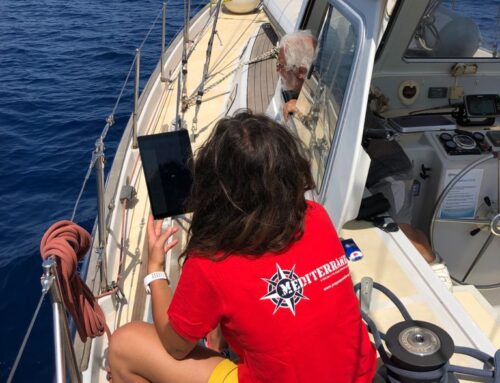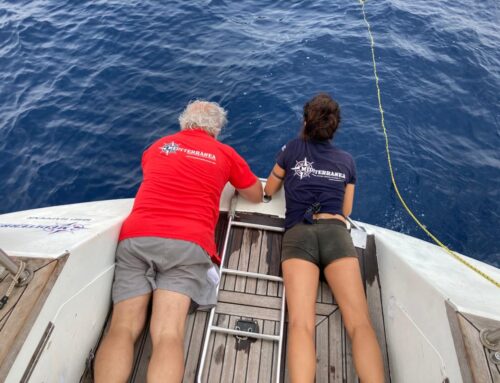(by Simone Perotti)
“Countries of the Mediterranean do not exist. Only cities and people of the Mediterranean exist“.
This is the original manner in which we are welcomed by Denys Zacharopoulos, Art Director of the Athens MAM (Alex Mylona Museum) and the MMCT (Macedonian Museum of Contemporary Art) of Thessaloniki, former semiologist, art expert, professor of the history of art in many European universities, author and co-curator of one of the Venice Two-Year Art Exhibitions, as well as of an exhibition and paper on the concept of the“Mediterranean Experience” and countless other top-ranking experiences in his homelands: the USA, France and Greece.
And judging from his perfect Italian, even Italy.
“Could citizenship of the Mediterranean be a way to recover our identity, above all by young people. It is a cultural suggestion, like that of belonging to an immense but not unlimited sea-space, that thus not only drives us elsewhere but makes the stagnation suggestive. The Iliad and the Odyssey, the two rival horizons”.
What then is the Mediterranean? “I am not interested so much in the Braudelian approach to the Mediterranean seen as the composition of a cultural environment that acts as the link between three continents, but rather in a series of impressions, events and experiences taken from the daily life of common people”. “That is why Greek art or a Greek style does not exist, but are the languages and circumstances in which the Greeks create art, dialoguing with the unlimited of which art itself is an interface, a link”.
“When in the 70’s a number of committed people of the civil society founded the Thessaloniki Museum (MMCT) of which I am currently the Director, they did so believing that the only way to save the Country from a new dictatorial and fascist crisis would be to cultivate art and culture, and disseminate it. And today this is the still the inspiring principle of the MMCT”. “The fact is that today a risk of fascism still exists, not political fascism, which is forced to show itself as moderate party to gains votes during elections, but fascism with a fundamentalist matrix. Religious fundamentalism is today the new genetically modified fascism, and it is even worse if one considers that fascism in Italy lasted about two decades while fundamentalism has a history and roots of at least 100 years”.
“In Greece, art dialogues transversally, both abroad and towards the interior of the country, and above all in the cinema world where it has an extraordinary vitality. Young people seem to attempt to create their own social position even through art, because it is one thing to sit at a bar as an unemployed person, and quite another to sit at the bar talking, listening, and then putting that experience into a work of art”.
“I believe that even in Greece people are opening up to the question of Mediterranean citizenship, even if, as I said previously, Mediterranean goes beyond the borders of countries, and is transversal to cultures and languages, forms and styles, and thus, artistically, but also socially, this mix, this contamination, and thus this area, already exists”.
“You can’t eat with art ” said a well-known Italian politician. Is this what politics thinks in Greece too? “If it did, it would mean that Greek politics has taken a forward. Even a terrible opinion like this is something, at least it is an opinion. Which is something that Greek politics doesn’t have”.
Zacharopoulos continues, giving us his impressions, his original ideas, as an open and free intellectual, which are at times even surprising. “The matriarchal Mediterranean society is personified to perfect by the Prime Minister Merkel. Is she perhaps not the big mamma who keeps the house in order, complains if something is not going well, holds the purse strings and guarantees to everyone that someone is there to take care of the important things? And don’t those who criticise her resemble the classic Mediterranean male who sits at the bar because he knows the woman of the house is taking care of everything, and lays down the law and mutters with a cup of coffee in his hand? But sitting comfortably at the cafe is no way to start a revolution. Above all because the Mediterranean man is at a standstill, in crisis, deprived of a role and no longer moving, he lacks energy, contrary to women who are moving and are reactive. And let me offer a provocation in this regard: none of the women in mythology (Helen, Europa, Medea and many others), were Greek, but “barbarians”, namely they came from elsewhere. This thought is stimulating, is it not”. Zacharopoulos smiles, and then shows us around the museum, he speaks to us of the anti-conformist and independent figure of Alex Mylona, who left her children, who were then adults, and her husband to live on an islands with a number of fiends (women) to pursue her individual artistic and social following. She too is a Medea and the work of art at the centre of a hall in the Museum is entitled just that …






Leave A Comment